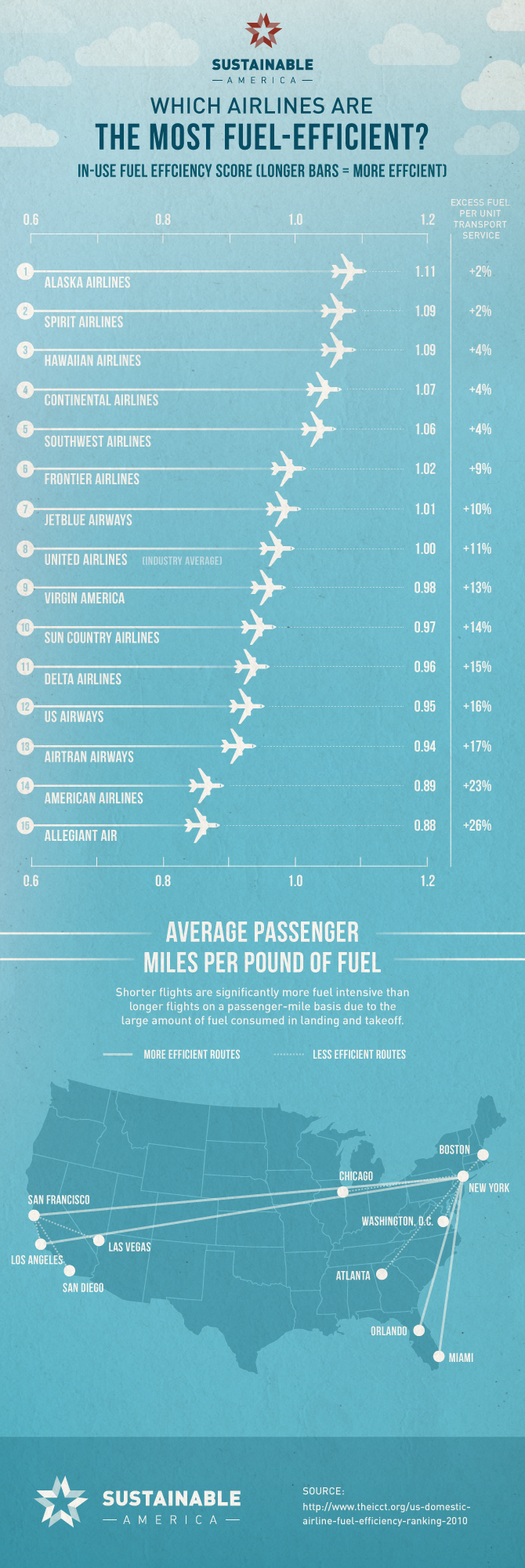While there has been a lot of progress in fuel efficiency for vehicles in America, less has been said about fuel efficiency for our other main form of transportation: airlines. Last summer we wrote a story about biofuel advances in the airline industry, but what about fuel efficiency? Aviation activity currently consumes about 10 percent of global transportation-related oil—around 4.5 million barrels per day—and this is expected to at least double by 2030, according to the International Council on Clean Transportation (ICCT).
A new report is giving passengers a chance to see in concrete terms how U.S. domestic airlines measure up against one another for fuel efficiency. The report is the product of a new methodology developed by researchers at the Federal Aviation Administration’s National Center of Excellence for Aviation Operations Research (NEXTOR) at the University of California, Berkeley, and was sponsored by the ICCT. It’s based on annual fuel-consumption data reported by the various domestic airlines to the U.S. Bureau of Transportation Statistics for 2010.
The researchers looked at both straight-line passenger miles between origin and destination and the airports served and/or flight frequency. Their approach allowed them to precisely distinguish between fuel that was burned to provide a certain level of service and fuel that was burned as a result of inefficiencies such as old equipment, poor route management or taxiing with two engines instead of one.
Here are the rankings:

As you can see, Alaska Airlines came out on top and Allegiant Air was least efficient. The bigger air carriers were clustered near the middle or bottom, and some have been involved in mergers since these numbers were reported. Some of the key findings as published by the ICCT were:
* There was a 26 percent difference between the most-efficient airline (Alaska) and the least-efficient (Allegiant) overall.
* About a third of the variation in fuel efficiency is attributable to aircraft technology, with the remainder due to factors like seating density, percent occupancy, ground operations practices, etc.
* On city-city routes, the difference between the most- and least-efficient carriers ranged from 9 percent to 87 percent. In several cases, the most fuel-efficient airline on a given route was below average overall.
* Shorter flights are significantly more fuel intensive on a passenger-mile basis, due to the large amount of fuel consumed in landing and takeoff.
* Airline fuel consumption is highly correlated with, and largely explained by, the amount of revenue passenger miles and flight departures it produces.
* Depending on the methodology applied, average airline fuel efficiency for the year 2010 is 9%–20% less than that of the most efficient carrier, while the least efficient carriers are 25%–42% less efficient than the industry leaders.
* Potential cost savings from improved efficiency for mainline airlines could’ve been as much as $2–$3 billion in 2010.
Some of the airlines scored lower on the rankings because of inefficient commuter flights, but they were actually very efficient on longer distance trips. This realization led the researchers to conclude that route-specific data could be really useful for people who wish to minimize their carbon footprint by choosing the most efficient airline for their trip. The full report offers comparisons of several popular routes by airline. (And don’t forget about train travel for shorter distance commutes.)
Sustainable America has set a goal to reduce oil usage in America by 50% by 2035. Reducing the amount of oil used in aviation will play an important role in achieving this goal. With better information, we hope that informed consumers will favor airlines that are more efficient, and greater transparency will encourage airlines to employ best practices in the future.
